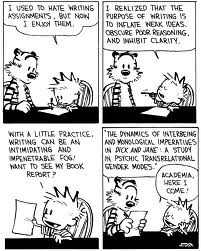I'm almost finished with a graduate program that requires a LOT of academic writing. This is a totally different genre from fiction, as Calvin demonstrates so succinctly.
Fiction writing, on the other hand, defines itself by carefully orchestrated simplicity. As authors, we take our readers by the hand to lead them down our winding story road. If we lose them, in most cases it's because they fell into a plot hole or were stolen by an evil, off-topic tangent.
Just like little kids first learning the mechanics of writing, we all have weak areas that show up in our writing. Our mastery of language comes through in what we write. This is why college professors, MFA instructors, and editors urge writers to read Strunk & White’s Elements of Style and other books on writing. If writing is an art, our grammar, word choice and structure are the canvas on which our stories are painted.
The difference between a master and a student is simply this: enough practice to recognize/catch these tendencies in the first draft. (And I’m nowhere near able to do this – which is why I have critique partners!)
1.A whole lot of nothing. In other words, your words take the reader nowhere. It takes 850 words to get your MC out of bed, or the MS reads like a playbook of movements – from the house, to work, to lunch, etc., with zero plot points to tie it together. Yawn. *checks watch*
2.Rambling/useless chapters. This is similar to #1 except the concept extends to chapters instead of scenes. Chapters are like rungs in a ladder – they’re supposed to take a reader to the next level. If they don’t move the story, your ladder turns into a treadmill.
3.Plotted like a potato plant. Here in my part of Alaska, we grow a lot of potatoes. To plant one, cut a potato in half and watch it grow. An emergent writer starts out with a great idea and then, presto, soon there are shoots popping out of the ground every which way. The reader has no clue which is the main idea because there’s so much going on.
4.Overwriting. Agent Mary Kole wrote a great post on how this rears its ugly head. All I’m going to say is: don’t tell us what you’ve just shown us is happening in your MS. It’s the equivalent of leading us there and then grabbing our face while yelling: “Look!”
5.Not enough tension. The reader needs to know why he/she is reading your story. Even a formulaic romance has the break-up. This is one I’m struggling with and it reminds me a bit of keeping a bunch of rubber bands tight while juggling a ball with one hand. According to Kristen Lamb, conflict must be constant.
6.Grammatical errors. Spell check is great but if you correctly spell a misused word, it’s still misused. Whether it's the incorrect use of they're, their or there, or the misunderstanding that you DO NOT add a possessive to a plural word (ie parent’s when you mean the two people who raised you) routine errors shout AMATEUR.
7.Thin skin. Emerging writers are reluctant to send out their work and react with anger/fear/sorrow when given constructive criticism. Sometimes they avoid it, or say they’re writing just for themselves. My response to that: keep a diary. Stories are meant to be shared.
So what did I miss? Share more characteristics in the comments!


7 comments:
Awesome post! I am so guilty of #2 and am reading more craft books because of it. And #3. But I'm working on it. Great list!
This is a great list. I will contribute one more, that even experienced authors have to watch for: having two supporting characters who serve the same role and can be merged into one.
Thanks for the funny C & H cartoon, too.
This is a great list. I'm currently trying to edit the overwriting out of MS - and the first third has dropped 25% as a result!
I particularly liked the potato planting analogy - I've definitely written stories like that in the past - hopefully those days are behind me! :-)
"It’s the equivalent of leading us there and then grabbing our face while yelling: 'Look!'"
Hah! I just laughed out loud! :D Great list, Melodie!
Not enough tension. That's me! I worry so much about over-writing that sometimes I forget that it's okay to spend more than one scene on a major conflict :-)
I was guilty of number four! Wow! It's great to see how far I've come.
Alison - at least you only have 2 issues. I've been guilty of all of them at some point!
Angelina: Agree about the character overlap. My rule of thumb for supporting characters is to use them like salt in cooking - sparingly with specific purpose.
Cally: It's potato harvest season here now. Amazing how one potato produces so many!
Hi Carrie! glad you had a chuckle. :))
Sarah: Me, too! I've gone from one extreme to the next in avoiding overwriting.
Emily: Isn't it amazing what practice will do to our writing skill? ;)
Post a Comment